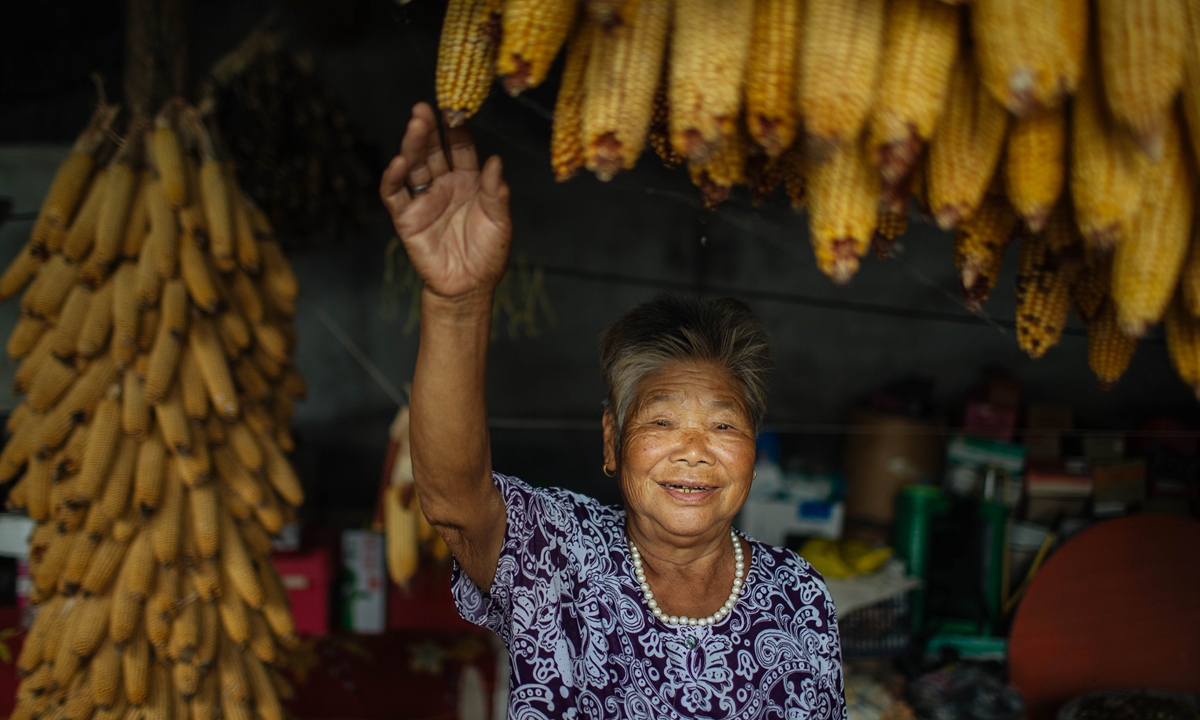
A visitor poses for a picture at an exhibition showcasing carpet art in east China's Shanghai Aug. 3, 2021. (Xinhua/Wang Xiang)
China on Thursday issued a white paper on how its achieving all-round moderate prosperity, or
xiaokang, boosted universal human rights in the country, as analysts said it is a "slap in the face" of the US and the West, which have been racking their brains to attack China on "human rights" issues, and also offers a "Chinese approach" on human rights development for other developing countries.
Titled "Moderate Prosperity in All Respects: Another Milestone Achieved in China's Human Rights," the white paper was released by the State Council Information Office on Thursday. It introduces China's practices and achievements in realizing moderate prosperity and advancing human rights: ending extreme poverty and securing the right to an adequate standard of living, protecting civil and political rights with the law and governance, and promoting social equality and protecting the rights of disadvantaged groups.
The white paper was released one month after China announced the completion of the goal of building China into a moderately prosperous society in all respects, and it showed that the moderately prosperous society not only includes developments in terms of the economy, politics, culture and ecology, but also the development of the people, Chang Jian, deputy director and professor of the Zhou Enlai School of Government in Nankai University, told the Global Times.

China on Thursday issued a white paper, showing boosting human rights while achieving moderately prosperous society. Graphic: GT
At a grand ceremony to commemorate the 100th anniversary of the founding of the Communist Party of China (CPC) in Beijing on July 1, Xi Jinping, general secretary of the CPC Central Committee, solemnly declared the completion of the goal of building China into a moderately prosperous society in all respects.
China's realization of moderate prosperity serves as a solid foundation for human rights, and it takes a deeper and broader perspective on this cause. It represents comprehensive progress in ensuring universal human rights in China, and a new contribution to the world's human rights cause, read the white paper.
The white paper noted that poverty is the biggest obstacle to human rights, and the CPC and the Chinese government have directed extra attention to poverty alleviation. By eliminating extreme poverty, China has won the biggest and toughest battle against poverty in human history, to the benefit of the largest number of people. The achievements help secure the right to food, safe drinking water, essential medical services, safe housing for the poor, and compulsory education in poorer areas.

Qiu Fengqin, an 83-year-old Yuanxin villager, expresses happiness with her current life Photo: Li Hao/GT
In building a moderately prosperous society in all respects, China is committed to boosting human rights with development and securing economic, social, cultural, educational and environmental rights. As a result, its people now lead more prosperous, secure, harmonious and happier lives.
For example, amid the COVID-19 pandemic, China has done everything possible to treat all patients. The government promptly adopted policies to subsidize medical expenses for COVID-19 to ensure that patients could receive timely treatment.
"The white paper displayed how China is practicing its pattern of protecting human rights - insisting that the right to subsistence comes first among all human rights. By developing the economy, we laid a solid foundation to promote the protection of human rights. We made this strategy as a developing country, and it has become our most important experience," Chang said.
Zhang Yonghe, executive dean of the Human Rights Institution of the Southwest University of Political Science and Law in Chongqing, said that China has turned from a poor and weak country into a moderately prosperous society in all respects, and such achievements are rare in human history. This not only offers a Chinese approach for economic development but also for human rights development, which could be learned by other countries, especially developing countries.
"It has been 30 years since China issued its first white paper on human rights in 1991. Aside from releasing white papers on overall human rights developments, we also have issued ones on the Xinjiang and Tibet regions to tell the international community what China has done in these fields, and more importantly, to refute malicious attacks by the US and the West," Zhang told the Global Times.
The new white paper is China's second white paper released in 2021 with "human rights" in the title. On June 24, the State Council Information Office released a white paper titled "The Communist Party of China and Human Rights Protection - A 100-Year Quest."
Analysts said that in recent years, the US has more often used human rights to attack China - from sanctioning officials in the Hong Kong Special Administrative Region over "human rights concerns" to hyping "genocide" accusations in China's Xinjiang region, and it is rallying allies under the "human rights" and "democracy" banners ambush China.
For example, US President Joe Biden said Wednesday he will convene the first of two meetings of the leaders of the world's democracies in December to defend against "authoritarianism" and "respect human rights."
China's fast development really worries the US and the West, and what is worse is that practices have proved that China's pattern of human rights development is effective and achievable, which may attract the interest of more developing countries, experts said.
The idea that more countries may learn from China's styles and patterns irritates the US, pushing it to ramp up efforts to attack China in human rights fields, Chang said.
However, analysts said that facts speak louder than words and China's achievements in terms of human rights protection, which have been witnessed by the international community, are a slap in the face of the US for its smearing.






